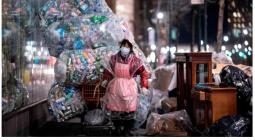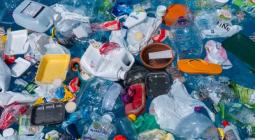How the plastic industry turned the pandemic to its advantage
With its products proving indispensable to combatting Covid-19, the plastics business is reinvigorated. What will it take to bring this major polluter to heel?
There are only two reasons that the plastics industry will change, a polymer scientist once told me: war or legislation. Corporations along the plastics value chain have faced a number of environmental and health crises, from toxic scandals to marine plastic waste and the climate emergency. Each of these crises has led to new laws and regulations, despite corporate efforts to undermine them.
In the two years leading up to the pandemic, the public backlash against plastic was a major concern for industry leaders. As a corporate executive remarked during an industry event early in 2019: “We need to get the image of plastic in oceans out of the public’s mind. Otherwise, we could lose our social licence to operate.” Of course, the pandemic did not take the image of plastic in oceans out of the public’s mind. However, it did highlight in a very real and urgent way the importance of many plastic products for healthcare and hygiene. At the virtual World Petrochemical Conference in April 2020, an industry analyst commented on this unexpected shift: “Ironically, sustainability, the issue that was dominating the conversation until just a few weeks ago, seems to be fading into the background, at least for the moment. And polyethylene may even be gaining some public favour as it plays a high-profile role in combating the greatest health risk to our planet in modern history.”
This temporary respite from public anti-plastic sentiment opened the door for industry to push back against single-use plastics bans. In July last year, the European Commission rejected the industry’s request to delay the EU Directive on Single-Use Plastics. However, multiple single-use plastics bans and deposit return schemes were reversed or delayed in countries around the world, across North America, Europe, Africa, and Asia.
During the pandemic, plastic was restored to its original paradoxical status as both a miracle and a menace for society. As far as industry was concerned, this was enough: it had regained its social licence to operate. By the end of 2020, industry leaders had fully embraced the new pandemic narrative about the essential role of plastics in society and many expressed optimism about their future growth. At the virtual World Petrochemical Conference in March 2021, industry analysts identified four key “Covid demand drivers”: food packaging, bag ban delays, online shopping, and hygiene and medical.
As one petrochemical industry executive enthused: “The Covid-19 pandemic highlighted how essential all our products are to everyone in society around the globe. We saw record sales and record volumes for our products throughout the pandemic… over the long term we can continue to see that kind of growth, and we’re going to see that accelerate as economies reopen around the world. All of this is really driven by the world’s growing global middle class, and that’s going to drive demand for the products we produce. Covid-19 didn’t change our long-term view on the fundamentals.”
A key tactic of industry is to blame consumers for plastic waste, which diverts attention from corporate responsibility
Hearing these glowing industry reports about single-use plastics growth, I couldn’t help feeling guilty about the plastics that have entered my home in the UK during the pandemic. Many environmental activists and researchers have pointed out that one of the key tactics of industry is to blame the consumer for plastic waste, which diverts attention from corporate responsibility. The plastics crisis is a systemic problem, however, and most people are locked into supply chains and infrastructures, unable to simply opt out of plastics consumption.
According to a recent study published in the journal Science Advances, the United Kingdom is second only to the United States in terms of the amount of plastic waste generated per person, at 99kg and 105kg per person per year respectively. Supermarkets with over-packaged food are one of the main problems. By contrast, the global average of plastic consumption is 45kg per person per year, and as little as 4kg per person per year in India. Looking at the consequences of one’s own actions, from a privileged standpoint, multiplied and intensified across the planet, invites a kind of vertigo.
While voluntary corporate commitments to end plastic waste have flooded in, the plastics crisis has kept getting worse. Some of the most scathing reports have emerged during the pandemic, such as the Changing Markets Foundation’s report Talking Trash, which concluded that “the Covid-19 health crisis has, once again, shown that Big Plastic is always primed and ready to co-opt a crisis to its advantage, pushing to undermine environmental legislation or any restrictions on its products… [T]he plastics industry does not have people’s best interests at heart; instead, it is making cold calculations to carry on with business as usual.” The Talking Trash report focused on the inadequate voluntary commitments of the top plastics polluters in the consumer goods and beverage industries, and the corporate “playbook” for undermining plastics legislation, particularly deposit-return schemes and single-use plastic bans.
One important lever for changing the plastics industry has gained traction during the pandemic: the dawning realisation by many investors and policymakers that green recovery paths to net zero will need to phase out fossil fuels altogether, including virgin (brand new) plastic. In September 2020, the thinktank Carbon Tracker warned investors in plastics about the risk of holding stranded assets in the transition away from fossil fuels. Plastic is the last pillar of oil demand growth, its researchers argued, but this pillar would be removed very soon by increasing regulatory and recycling pressures, accelerated by green recovery packages.
The need to reduce the reliance of plastics on fossil fuels has also featured in a number of policy proposals, dovetailing with the momentum to respond to the climate emergency through green recoveries after the pandemic. The US Break Free from Plastic bill re-emerged early in 2021 under the Biden presidency, incorporating calls from environmental activists and frontline communities to halt petrochemical projects and to hold corporations accountable for waste and emissions throughout the plastic life cycle. Plastics sustainability, incorporating net zero emissions targets, is also a prominent part of the European Green Deal. Furthermore, reducing virgin plastic production is a core (if contested) topic for debates about the scope of a new UN treaty on plastics, amid growing recognition from many governments, organisations and researchers that the problem of plastic pollution extends through the plastics life cycle, from the extraction of raw materials through to manufacturing, consumption, waste and pollution.
If there is any insight that can be gained from looking at the ways corporations have responded to the plastics crisis, which has magnified during the pandemic, it is the power of legislation. Binding laws and regulations offer less room for manoeuvre than voluntary commitments, especially when it comes to bans. The plastics industry is more concerned about the threat of the European Single-Use Plastics Directive, which is binding legislation, than the Ellen MacArthur New Plastics Economy Global Commitment, which is based on voluntary circular economy commitments. Outright bans of specific plastic products, on the grounds of protecting the environment or public health, effectively take these products off the market.
The pandemic has made clear that we need legislation and binding regulations to address the plastics crisis, but we also need another lever of change. We need to keep questioning the dominant assumption that there can be continual plastics growth on a finite planet. If this assumption could be overturned, aligning with the growing consensus that the world needs to transition away from fossil fuels, that would be a starting point for meaningful change.
-
This is an edited extract from Plastic Unlimited: How Corporations are Fuelling the Ecological Crisis and What We Can Do About It by Alice Mah, published by Polity Press







